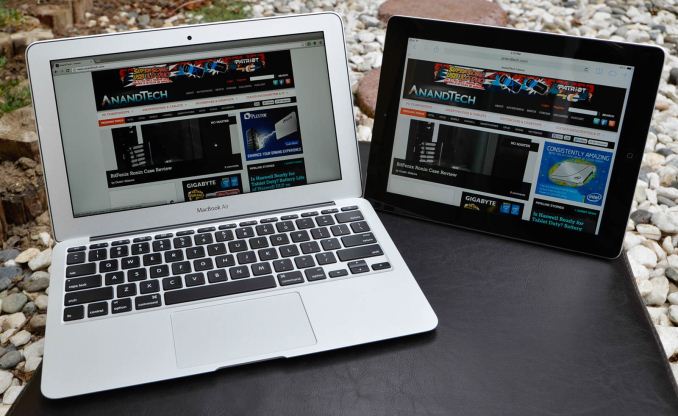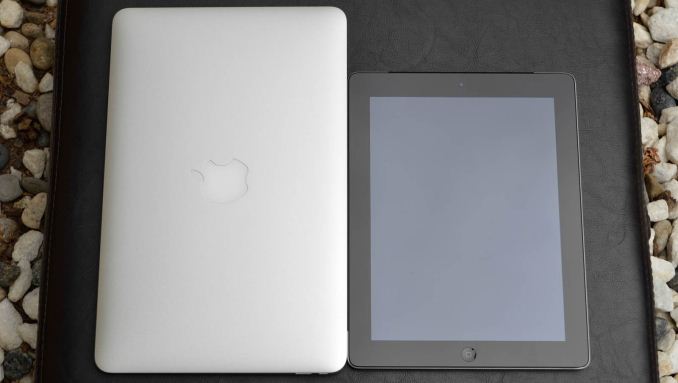The 2013 MacBook Air Review (11-inch)
by Vivek Gowri on August 9, 2013 1:45 AM ESTSince the last time the iPad versus MacBook Air 11” comparison was brought up, both products have improved and evolved tremendously, the iPad more so than the Air. It’s easy to dismiss even making the connection (because who here actually cross-shops a high-end ARM tablet with a mid-range ultraportable, raise of hands please) but I think there are enough shared attributes to make a discussion worthwhile, especially considering the similarity in terms of form factor and now battery life. If I was looking for an extremely compact, thin, light, and long-lasting companion device to bring on a trip, they’re both completely valid answers. But which would I actually take?
The short answer would almost always be the Air, for a variety of reasons, but I’ll get there. This basically goes back to the tablet versus notebook conversation for various usecases. The iPad is awesome as a travel device, as are most tablets in general, and you can see evidence of this in any airport terminal. Especially after the screen upgrade last year, the iPad is hands down one of the best content consumption devices on the market. It’s also my absolute favorite digital platform for reading. I’ll actually save lengthy articles, like some AnandTech reviews and other long-form content from other websites I enjoy, to read on my iPad. Between the sharpness of text on the Retina display and the physical closeness you have with the words, it’s about the closest you can get to a paper reading experience on an LCD. (This also holds true for any high-DPI tablet, including the Nexus 7.2, Nexus 10, Surface Pro, and others). Also, the ability to use a tablet with only one hand, not needing a platform of some kind, and general versatility of physical handling adds a convenience factor that’s hard to get from a notebook.
But when the tablet doesn’t have an inherent advantage in terms of size or battery life, it’s a lot harder to justify skipping the sheer versatility and power you get out of a real notebook computer, even a small one, for reasons that amount to the tablet being easier to use while standing up. The notebook is basically better at everything other than reading, and there’s far more computing horsepower at your disposal. You have far more control over everything that happens—media, browsing, documents, you name it. And there’s a real, physical keyboard, so in terms of productivity, there’s just not a conversation. To some degree, that’s always been something that held tablets back for me and I suspect the other editors on staff. Admittedly, our usecases typically involve a lot of writing and email, neither of which is easy at all without a hardware keyboard, so we’re probably not the right target demographic to judge tablets by.
The capabilities of a Core i5-based ultraportable are so far beyond that of an iPad or Nexus 10 though, which is part of what makes this on the surface a somewhat odd comparison to be making. Obviously the tablets are cheaper, though it’s worth pointing out that a 128GB iPad (WiFi) is only $200 less than a 128GB Air 11”, and as noted earlier the iPad keyboards typically run $100. I don’t know why anyone would need that much storage on an iPad, maybe if you had a ton of 1080p video content that you really needed to carry with you everywhere. The 16 and 32GB iPads, at $499 and 599, are obviously far more accessible and probably more sensible investments.
I’m not trying to recommend that people buy the Air over the iPad, just that it’s possible to do so with very little compromise. It wasn’t really something you could do until now simply because of battery life, but with Haswell ULT boasting similar or better power efficiency than high-end ARM SoCs in light everyday CPU-driven workloads, it’s certainly something to think about. I think the best of both worlds situation is yet to come, possibly with something that looks like a thinner, Haswell-based Surface Pro with Windows 8.1 and significantly better battery life than we’ve seen out of Ivy Bridge tablets in the last year.












139 Comments
View All Comments
Torrijos - Friday, August 9, 2013 - link
One has to wonder how much more battery life improvements OS X Mavericks will bring, seeing how Apple made most of their selling points about energy efficiency.xTRICKYxx - Friday, August 9, 2013 - link
I've been using Mavericks for a while and I haven't noticed anything too drastic. I typically get around 7-8 hours of light workload for my 15". At most maybe a 10% increase.But this is not including the fact that most of my 3rd party apps do not include App Nap yet. It could make a difference.
ctrocks - Friday, August 9, 2013 - link
I still want to know the fascination with 11 inch notebooks. I am 6'3" (1.9m) tall, with relatively large hands, and am 47 with good vision for my age (no glasses needed yet). 13 inch notebooks seem small to me, let alone 11. My hands can't fit comfortably on keyboard to touch type.I understand portability, but I just can't see using such a small device except for cases where extreme portability is an absolute necessity. I would prefer a 15 inch screen, and a bigger keyboard that fits me over portability.
abazigal - Friday, August 9, 2013 - link
You just answered your own question. Ultra-portability. 15-inch laptops are great to use, but absolute murder to haul around when it's time to pack up and leave.ananduser - Friday, August 9, 2013 - link
Since you talked about the new Sony Vaio, how about, you know, actually reviewing one(the Pros or the Duo or both). You(Anandtech not Vivek) have reviewed 3 MBAs already and not a single other ultraportable.BTW corners have been cut in order to achieve the MBA's battery life, the low res screen and the relatively slower CPU. Why not mention it so as to compare apples to apples(no pun intended)?
fokka - Friday, August 9, 2013 - link
though i'm not a big fan of the mba, i still think that it is a valid choice for someone seeking portability and not dependent on a ton of processing performance, even more now the battery life has improved to a level you don't really have to think about it much anymore on a day to day basis.sure, the display is a bit of a bummer, but only because we became so spoiled by tablets and high-DPI laptops in the recent years. still, it won't hinder you doing any of your work.
what i like about the air and essentially the entire macbook line-up, is that they are no-nonsense solutions. you get a great package of high quality case, great input devices, above average display quality and most important usable battery life on a mobile device.
just compare it with the vaio pro. i love some of the vaio lineup for their performance, features and portability, but no way in hell i'm going to shell out this much for a plasticy-feeling computer, no matter if they call the material carbon fiber, magnesium, or whatever they come up with.
still, using a 2010 mbp13 right now, i'm not really thinking of investing in apple gear again very soon since i learned to prefer a more native windows environment. this is where asus zenbook line comes into play and i hope they can make similar progress with the haswell upgrade as apple, all while providing a great 1080p display.
ESC2000 - Saturday, August 10, 2013 - link
So a plastic feel would stop you from an otherwise superior product? Thus is the same tired old argument always trotted out by Apple fans. They used it when the S4 came out with features that demolished the iphone 5. They've probably used it for every Samsung phone that has been released with that prole plastic.It is your business how you spend your money, but I but devices to perform tasks for me. If a physical feature is relevant to function (eg the air's unnecessarily large bezels take up precious screen real estate) then I care. But if the best device for me comes in plastic I don't care unless plastic will disrupt its functioning. I don't care whether other people think my device looks expensive. I don't care whether it feels 'plasticky' when I touch it. What is so terrible about plastic anyway?
I know this is a tired old argument. I should probably save this post in keep so I can just copy paste it every time someone tries to say metal is more premium. Apple did do a good marketing job on that one though.
fokka - Saturday, August 10, 2013 - link
i wouldn't even go so far as to call myself an apple fan, since the macbook is the only apple product i ever owned and i'm not having plans on upping that count in the future, but still, i can appreciate certain aspects, like the build quality, of their line up.see, in the end it's just personal preference. i for one wouldn't be happy with a "superior" machine hardware wise, if it feel plasticy and flimsy. and please don't tell me a VAIO lid doesn't feel flimsy. i can't comment specifically on the VAIO pro, but about every sony ultraportable i ever touched had a crazy thin display lid which twisted by mere looking at it, so i feel safe extrapolating from that.
if you are happy with a polycarbonate build that's great and i don't even mean this sarcastically, but for me, i want a device i use for hours to feel great and sturdy and i find this is more the case with a good metal build.
geok1ng - Friday, August 9, 2013 - link
U$1000 for a 768p TN panel. I do agree with the review: lets wait for the Surface Pro with Haswelll parts. Or get a real high end ultraportable with a real high end display, for the same price apple is asking for this airthingieabazigal - Friday, August 9, 2013 - link
Higher screen res typically comes at the expense of poorer battery life. Apple simply made a judgement call to prioritize battery life over everything else. I don't see that as an inherently bad thing.